Hidden Costs That Can Derail Your Home Renovation (and How to Avoid Them)
So, you’ve watched a few too many episodes of Fixer Upper, your Pinterest board is bursting at the seams, and you’re ready to turn that dated kitchen into something worthy of a lifestyle magazine. Awesome. But before you grab that sledgehammer like you’re auditioning for Property Brothers, let’s talk about the sneaky, wallet-draining gremlins of home reno: hidden costs.
Because nothing kills renovation vibes faster than finding out your “quick weekend update” just turned into a full-scale operation worthy of its own reality show season. And sometimes, those surprises are exactly when you end up calling a restoration company to fix what’s been lurking behind your walls all along.
Let’s break it down.

1. Surprise Structural Issues — AKA “The Oh No Moment”
Picture this: you’re tearing down that non-load-bearing wall between the kitchen and the dining room, dreaming of open-concept glory. Halfway through, you notice something’s… off. Maybe it’s a weird beam placement, maybe it’s rot that smells like a damp attic in July. Either way, congratulations—you’ve just unlocked the structural surprises level.
This happens more often than homeowners think. Florida houses, in particular, can hide termite damage, water intrusion, or previous “creative” DIY solutions behind drywall. And when that happens, your budget goes from “manageable” to “call the bank”.
2. Mold & Water Damage — The Uninvited Guests
Ah, Florida. Sunshine, palm trees, and humidity levels that could make a cactus sweat. Mold loves it here. And water damage has a sneaky way of hiding under flooring, inside cabinets, and behind tile.
One homeowner in Miami thought they were just replacing their shower tiles. Halfway through, their contractor discovered a slow leak behind the wall. The result? A full bathroom gut, black mold remediation, and a timeline that stretched from two weeks to two months.
3. Permit Problems & Code Upgrades — Bureaucracy’s Greatest Hits
Permits. Everyone groans, no one wants to deal with them, and yet they have the power to derail your project faster than you can say “change order.”
Let’s say you’re opening up a kitchen wall. You might discover that the electrical or plumbing behind it isn’t up to current code. Boom—now you’re paying not only for the renovation but also for necessary upgrades to bring the house in line with local regulations.
And Florida building codes? They’re strict, especially after all those hurricanes.
4. Material Price Swings — The Budget Rollercoaster
Renovation materials can fluctuate like crypto. One month your tile is $2.99 per square foot, the next it’s $4.50 and on backorder till next summer. Lumber prices in particular have been doing the cha-cha for years now.
A family in Orlando learned this the hard way when their dream oak flooring doubled in price mid-project thanks to a supply chain hiccup. Their contractor gave them two options: delay or downgrade. Neither was fun.
5. Living Expenses During Reno — The “Hotel California” Effect
Here’s one most people forget: where are you living during all this?
If your kitchen is gutted, are you eating takeout for six weeks? If your only bathroom is under construction, are you couch-surfing with family? These “soft costs” can pile up fast and are rarely factored into initial budgets.
6. Scope Creep — The Silent Budget Killer
“Since we’re already replacing the countertops, maybe we should upgrade the cabinets too.”
And just like that, your tidy little project has turned into a full kitchen remodel.
Scope creep is like the Marvel Cinematic Universe—once it starts, it keeps expanding. And it’s one of the most common ways renovations spiral out of control.
The Bottom Line
Hidden costs don’t have to be renovation heartbreakers. With a little planning, a touch of skepticism, and a few pro moves, you can keep your project on track and your wallet (mostly) intact.
Because at the end of the day, your dream home should feel like a happy ending, not a plot twist.

